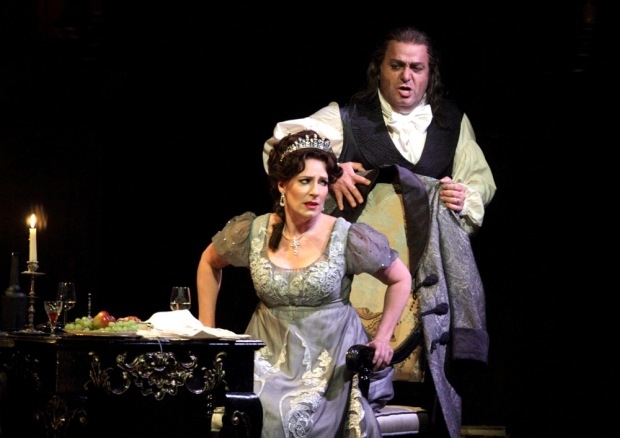Tosca (Royal Opera House)

© Catherine Ashmore
I wasn’t at the rehearsals so I cannot say, but there has to be a reason why this latest incarnation of Puccini’s Tosca fell so flat. Were post-Christmas blues to blame for the cast’s lack of match fitness, or did the ‘A’ team (an apparently well-received company led by Angela Gheorghiu) hijack too much of the available time? The evidence, certainly, suggested a harassed revival director telling his second-stringers to wing it. And, like the statuary over the Castel Sant’Angelo, they did.
It may simply be that the ‘B’ company hit the stage too early, for it is scheduled to give the remainder of its performances at the tail end of the current run. Who knows? I can only review what was placed before us.
Puccini’s melodrama sets a poisoned love-hate-lust triangle against a backdrop of political upheaval in early-19th-century Rome. Painter Cavaradossi, who loves the singer Floria Tosca, protects a fugitive prisoner then pays the price when the baleful, Javert-like chief of police Scarpia arrests him. That’s when things get messy.
The evening started well, with a wonderfully full-on account of Puccini’s ‘Scarpia’ motif from the orchestra. Indeed, conductor Emmanuel Villaume lent a thrilling pulse to the entire evening, even when his singers had other ideas.
Jonathan Kent‘s ten-year-old production, ravishingly designed by Paul Brown and and lit by Mark Henderson, has staying power and doesn’t need a roster of stars to punch its weight. It has never earned fewer than four stars from me on previous visits, sometimes five; but Andrew Sinclair‘s latest revival is, you’ll have gathered by now, a disappointment. Stage business is approximate and Roberto Frontali, a capable baritone albeit not blest with great darkness of tone, ambles through Scarpia’s gift of an act 2 in a disconcertingly generalised way, rarely drawing the attention and making little attempt to dominate the action. Scarpia without the gimlet eye is little threat, and a half-decent Tosca would have him on toast.
Alas, though, Amanda Echalaz was fathoms below her considerable best. In 2013 I wrote that she inhabited the title role in this production like a second skin, so it was distressing to hear her struggle on what was clearly an unhappy night. The voice tightened in odd places, intonation feathered under pressure and she cut short some of her money notes, not least in a disappointing "Vissi d’arte". Her power and technical command were there; she just ran out of steam.
Minor roles were a mixed bag; the best were Yuriy Yurchuk‘s urgent, focused Angelotti and Donald Maxwell‘s bustling Sacristan. However, the Cavaradossi of Najmidden Mavlyanov showed little character definition, let alone heroism, despite what we must assume were Sinclair’s best efforts. The Uzbek tenor followed up a stolidly unmoving "Recondite armonia" in act one with an unlyrical and (rare thing) applause-free rendition of his showstopper, "E lucevan le stelle", just before his execution. A tumbleweed moment, poor man. When Echalaz did her Fosbury Flop off the battlements he must have felt like joining her.
Tosca plays in repertoire at the Royal Opera House until 5 February. The alternate cast led by Angela Gheorghiu plays until 21 January; the cast reviewed above then takes over for the remainder of the run.










